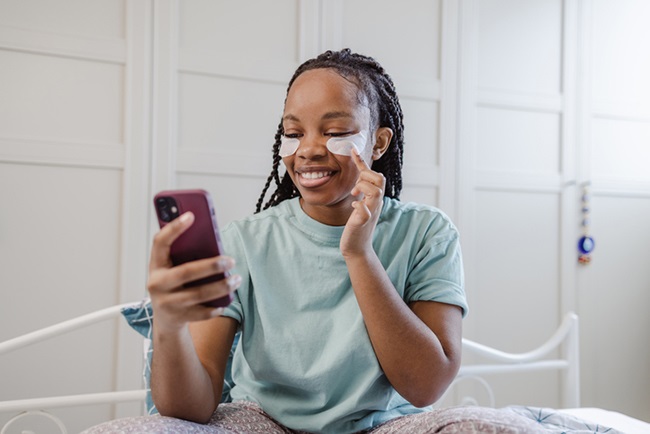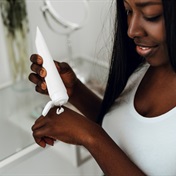
- Using household products like baking soda or apple cider vinegar can negatively affect the skin.
- Always do your own research and follow dermatologically-proven advice for skincare.
- Trends like using Haarlemensis and DIY chemical peels can be dangerous.
With social media platforms like TikTok, we have every corner of the world at our fingertips.
One might call it a blessing being able to explore firsthand the rise of 'clean beauty' worldwide or 'skinimalism' that rivals that of the 10-step Korean skincare trends.
But every trend should be looked at through scrutinous eyes – you never know what product might end up causing more harm than good.
That’s why TRUELOVE reached out to Dr Mamello Ntsele, a Durban-based specialist dermatologist, who helps us understand the good and the bad of popular skincare trends.
READ MORE | Does TikTok's okra water really improve your sex life?
The dos and don’ts of household skincare
Baking soda for glassy skin
Chances are, when scrolling through social media explore pages, timelines and for you pages you’ll come across the versatility of a household product.
Ever heard of using baking soda as an exfoliator? Or perhaps apple cider vinegar as toner?
While, in theory, these products might give you the baby smooth or glassy skin you’re looking for, Dr Mamello advises against using something like bicarbonate of soda on your skin because of how it can affect the skin’s pH balance.
“Bicarbonate of soda is an alkaline substance that changes the pH balance of the skin. Normal pH of the skin [is] around pH5. Adding bicarbonate of soda will increase the pH, making the skin dry, irritated and can lead to inflammation. It is important to use pH balanced skin care products that do not disturb the pH balance,” she explains.
If you can ingest it, you can apply it, right? Not necessarily
Although many of these trends use kitchen ingredients like apple cider vinegar or lemon juice, it can be a different story when applied to the face, especially for sensitive skin.
Dr Mamello warns that “apple cider vinegar or lemon juice are acids that should not be used as toners as they can also alter the skin’s natural pH causing burns, irritation and inflammation even in diluted forms.“
- No one's skin reacts the same. Dr Mamello shares a few words of warning for anyone looking to switch up their routine with
- Please do not take medical advise from unqualified social media experts.
- Follow qualified expert advise.
- Know that we are all different and what works for one may not for the next. An individualised assessment and care plan is important for anyone having skincare problems.
- Your dermatologist is a qualified skin specialist and your ultimate go to if having skin challenges.
Skincare trends from the eyes of an expert
Humans have been discovering natural ingredients for skincare across the ages and while some concoctions can reach the desired effect, it’s important to know both the positives and the implications of these homemade hacks.
READ MORE | Tea is not only for winter chills! 4 ways to use tea for improved health
Petroleum jelly, Haarlemensis and tissue oil for acne
A trend that has been taking South African TikTok by storm, this combination can cause more damage than one might realise. Haarlemensis is traditionally used for bladder and kidney issues, so it begs the question what this combination might do on the skin barrier.
Dr Mamello explains, "This combo is comedogenic and can block the pores and making acne worse."
Do make sure you use dermatologically tested ingredients before making any at-home remedies with household products.
Don't use this combination if you have oily or acne-prone skin.
Turmeric, milk, honey and lemon juice face mask
Turmeric has long since been an ingredient that helps with skincare because of its anti-inflammatory properties and how it helps with hyperpigmentation.
Do use turmeric sparingly and away from white clothing because it stains. Wait a day after doing a test on a small part of your arm to check for any allergic reactions.
Don’t mix different ingredients without testing, “the problem with mixing these agents is that even the measurements are not scientifically tested and may cause harm in some individuals,” Dr Mamello says.
DIY chemical peels
If you spend a lot of time online, you may have come across the viral phenol chemical peel that starts off with your face looking like something out of a horror movie only to reveal a whole level of smooth.
For those who hope to consider at-home chemicals to avoid the cost of dermatologically tested ones, knowing the right ingredients to use is crucial.
Do your own research, avoid the sun and gear towards reliable products and skincare ingredients like salicylic acid and glycolic acid.
Don’t skimp out on quality ingredients to save a few Rands and don’t be tempted to leave it on for longer than 30 seconds for your first application.
@truelovemagazine Come along with us as we take a tour of L’Oreal South Africa's lab. #lorealsouthafrica #lorealparissouthaftica ? original sound - TRUE LOVE











